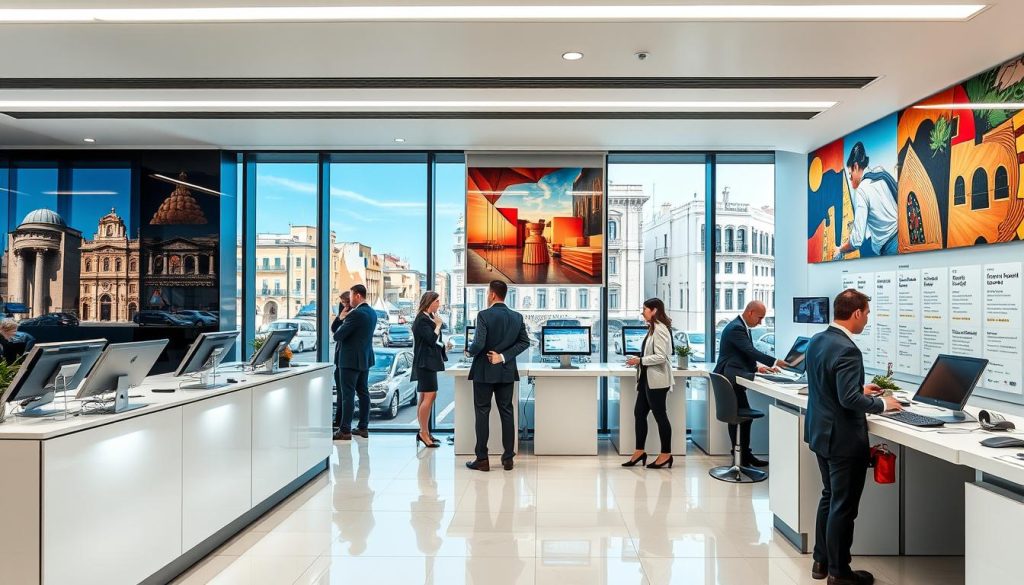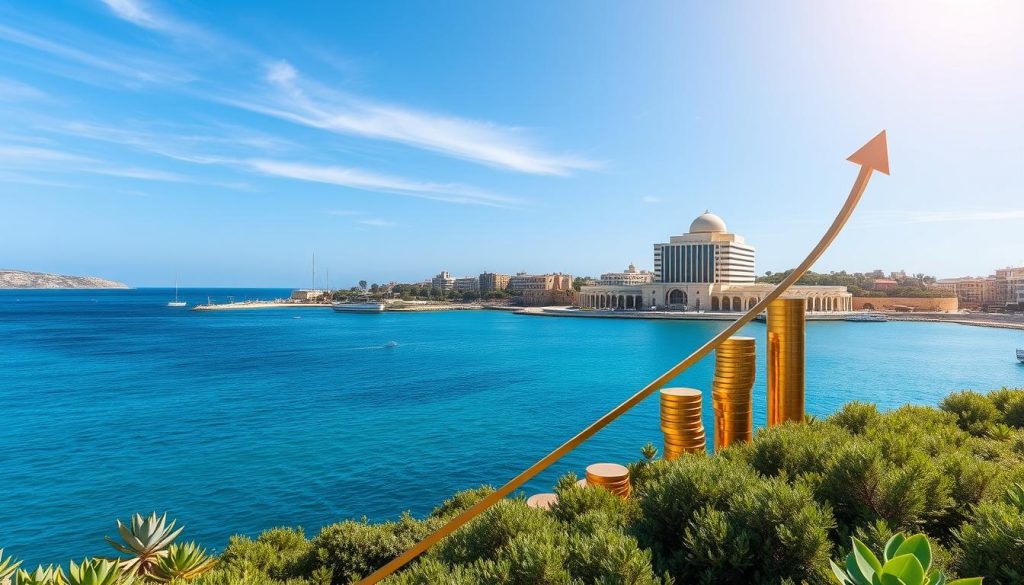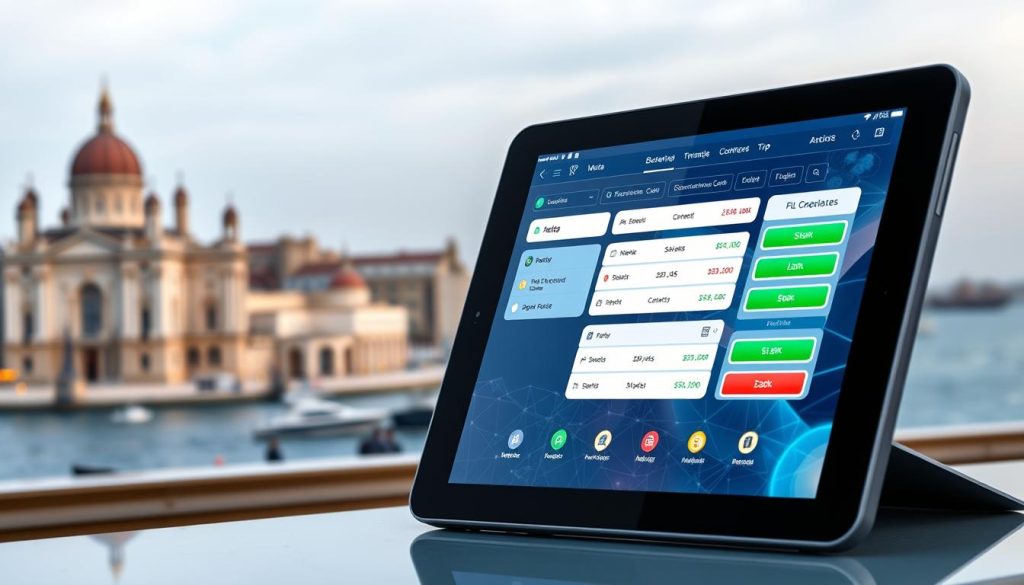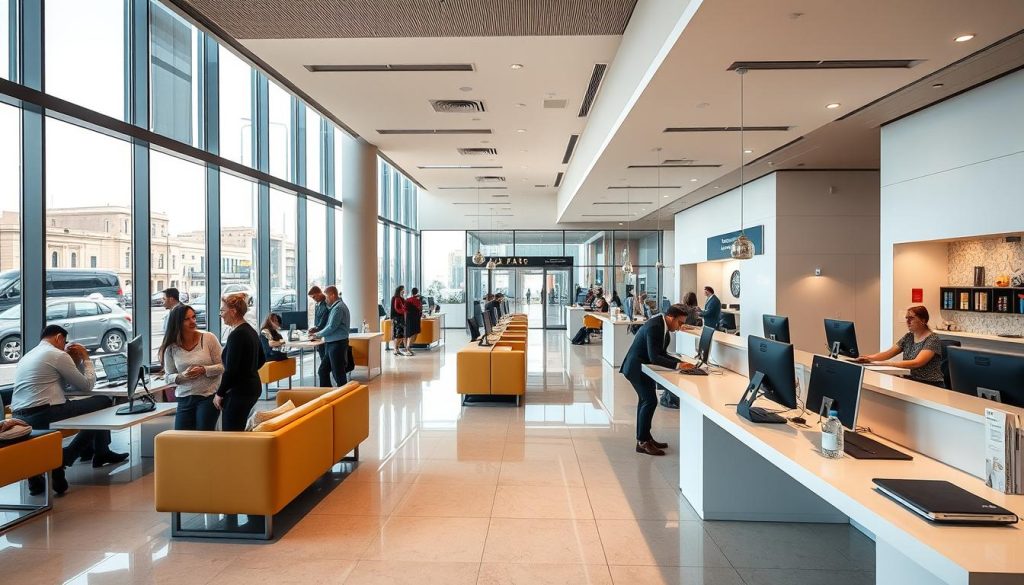Business Banking in Malta is key for growing businesses, especially for UK companies. Malta’s financial services are top-notch, thanks to good banking rules. This makes it a great place for businesses to grow.
Malta is in the Mediterranean and is part of the European Union. This makes it attractive to foreign businesses. The Malta Financial Services Authority ensures everything is done right, making Malta a top choice for banking needs.
The Importance of Business Banking in Malta

Business banking in Malta is very important. It helps businesses grow and keeps the economy stable. Banks give businesses the money they need for expansion and to improve how they work.
Business banking offers special services for entrepreneurs and small to medium-sized businesses. These services help manage money better. This means businesses can handle cash flow well and deal with unexpected costs.
Getting financial advice from banks is key for businesses to stay strong in Malta. With good advice, companies can make better choices. This helps them perform better and stay competitive.
Studies show that business banking is a big part of Malta’s GDP. This shows how banks and businesses work together. It proves that a strong banking sector is crucial for the economy to grow.
Key Features of Business Banking Services

Business Banking Services in Malta offer many features for companies. It’s important for business owners to know about the different Types of Accounts and financial products. This helps them get the most from their banking experience.
Types of Accounts Offered
In Malta, businesses can choose from various Types of Accounts. These meet their operational needs.
- Current Accounts: Perfect for daily transactions, making it easy to deposit and withdraw funds.
- Savings Accounts: Good for businesses wanting to save extra money and earn interest.
- Foreign Currency Accounts: For companies dealing with different currencies, making international transactions smoother.
Business Loans and Financing Options
Maltese banks provide Business Loans and Financing Options to support growth and needs.
- Term Loans: Fixed loans for specific projects with set repayment schedules.
- Overdrafts: Flexible credit for businesses to manage cash flow, allowing more than the account balance.
- Revolving Credit Facilities: Access to funds up to a limit, great for changing financial needs.
Eligibility for these options depends on the bank and product. Business owners should look at repayment terms and application processes at places like Bank of Valletta and HSBC Malta.
Business Banking in Malta: An Overview

The Business Banking Overview of Malta shows a strong banking sector. It is known for stability and growth. Many banks in Malta support both local and international businesses.
These banks offer a wide range of services. They are designed to meet the needs of businesses. This helps businesses grow and succeed.
Malta’s banking sector includes both local and international banks. This mix creates a competitive market. It gives businesses access to many financial products.
Malta has a solid Economic Framework that attracts businesses. The Bank of Malta oversees the regulations, following European standards. This ensures transparency and accountability.
International financial ratings also support Malta’s reputation. It is seen as a reliable place for banking. This makes Malta a top choice for businesses looking for a safe banking environment.
Choosing the Right Bank for Your Business

Choosing a bank for your business is a big decision. You need to think about what’s best for your money management. It’s important to know what you need and what banks offer. This will help you understand the good and bad of each bank’s services and fees.
Factors to Consider When Selecting a Bank
When picking a bank, consider these key points:
- Interest Rates: Look at loan and savings account rates. They can affect your money plans a lot.
- Customer Service Quality: Check how well the bank talks to you. Good communication is key for your business.
- Digital Banking Capabilities: See what tech the bank offers. Things like online banking and apps are important for ease.
- Range of Services: Think about if the bank does more than just basic banking. Do they offer investment advice?
Comparing Bank Services and Fees
It’s important to compare bank fees carefully. Look at these things:
- Transaction Fees: Watch out for extra costs in everyday transactions or when sending money abroad.
- Maintenance Costs: Know the fees for keeping your account open. These can differ a lot between banks.
- Loan Charges: Check out the fees for borrowing. This includes things like processing and early repayment fees.
Listening to what other business owners say can help you decide. They share their experiences with different banks. By thinking about these points, you can pick a bank that helps your business grow and stay financially healthy.
Regulations Governing Business Banking in Malta

The rules for business banking in Malta are strict and secure. The Malta Financial Services Authority (MFSA) and the Financial Intelligence Analysis Unit (FIAU) enforce these rules. They make sure banks follow the law and keep financial systems safe.
Malta follows European Union laws closely. This includes rules on fighting money laundering. Banks must check who their customers are, watch their transactions, and report anything odd. This helps stop financial crimes.
Data protection laws are also key. Banks must follow the General Data Protection Regulation (GDPR). This means they handle customer data carefully and keep it private. It builds trust in the banking world.
To sum up, Malta’s banking rules make the banking scene stable and trustworthy for everyone involved.
Advantages of Banking in Malta for UK Businesses

UK businesses often look to Malta for its financial benefits. Malta’s banking scene is becoming more appealing. It offers unique advantages that can boost business growth and performance.
Tax Benefits and Incentives
Malta is known for its tax perks for UK businesses. It has low corporate tax rates, sometimes as low as 5% for specific incomes. This attracts foreign investment and promotes innovation and competition.
There are also special incentives to help businesses grow. For example, tax credits for research and development activities are available.
Stable Economic Environment
Malta’s stable economy is another reason for UK businesses to consider it. It has steady growth and a good regulatory setup. This makes it perfect for business.
The government’s focus on economic stability lets businesses operate with confidence. This reduces the risk of financial ups and downs. It’s great for both local and international companies looking to expand in Europe.
Digital Banking Trends in Malta

Digital Banking is changing the financial scene in Malta. It offers businesses new ways to handle their money. With Mobile Solutions, companies can manage their finances anytime, anywhere. This shift is making banking more user-friendly.
Mobile Banking Solutions
Mobile banking is becoming popular in Malta. It lets users do important banking tasks on their phones. Key features include:
- Real-time account monitoring
- Secure transaction capabilities
- Convenient bill payment options
- Customisable notifications to track spending habits
These features make managing money easy. They also improve customer satisfaction with their banks.
Online Account Management Features
Online account management is more important than ever. The COVID-19 pandemic has shown this. Businesses in Malta use Online Banking to stay efficient. The main benefits are:
- Easy access to transaction history and statements
- Ability to transfer funds between accounts swiftly
- Integration capabilities with accounting software for streamlined bookkeeping
These advancements give businesses better control over their finances. They help prepare for the future of banking.
How to Open a Business Bank Account in Malta

Starting a business in Malta means you need a business bank account. Knowing what you need and how to register makes it easier. This helps you smoothly enter the Maltese market.
Here’s what you need to do and what documents you’ll need:
- Proof of identity for all directors and shareholders, such as valid passports or national ID cards.
- Evidence of the business’s registered address, which can be a utility bill or lease agreement.
- Certificate of incorporation and memorandum & articles of association to confirm the business’s legal status.
- Description of business activities and financial projections for the first few years.
First, you’ll need to visit the bank with your documents and application forms. How long it takes to get approved varies. But usually, it’s a few days to a couple of weeks.
There are certain things you need to qualify for a business bank account in Malta:
- A registered company in Malta or a foreign entity with a Maltese presence.
- Minimum initial deposit amount, which differs by bank and account type.
- Clear indication of the account purpose and anticipated transactions.
There are different types of accounts, like current, savings, and foreign currency accounts. Each meets different business needs. It’s smart to compare banks to find the best deal.
Having bank contact details ready can help open your account faster. This supports your business in Malta.
Understanding Currency Exchange and International Payments

In today’s global economy, knowing about currency exchange and international payments is key for Maltese businesses. Companies doing business abroad face challenges like currency changes and fees. This part explains the perks of foreign currency accounts and the costs of cross-border deals.
Foreign Currency Accounts
Having foreign currency accounts helps businesses manage their international money moves. These accounts let companies deal in different currencies, reducing risks from currency changes. This makes it easier to handle money coming in from abroad or going out to suppliers.
Cross-Border Transaction Fees
It’s important to know the fees for international money moves to keep costs down. Banks charge different fees for sending money abroad, affecting profits. Businesses should look at what different banks offer to find the best deal. Working with currency exchange experts can also help cut costs and improve payment processes.
Future of Business Banking in Malta

The world of business banking in Malta is changing fast. New technologies and fintech companies are leading the way. They bring fresh ideas that make banking better. Banks must keep up to serve their customers well.
Innovations in Banking Technology
New tech in banking is bringing big changes for businesses in Malta. Blockchain and artificial intelligence are at the forefront. They promise to make banking faster, safer, and more efficient.
- Blockchain makes transactions safer and more transparent, cutting down on fraud.
- AI helps banks offer services that fit each business’s needs, guiding better financial choices.
- Real-time payments mean businesses can make and receive money instantly, meeting today’s fast pace.
These changes point to a bright future for business banking in Malta. Banks can use these new tools to improve how they work and serve their customers. By doing so, they can stay ahead in a changing financial world.
Customer Service and Support in Maltese Banks

In today’s competitive world, great customer service is key. Maltese banks focus on improving their service to keep clients happy. They aim to offer Banking Support that meets each business’s unique needs, making banking more personal.
Personalised Banking Solutions
Malta’s banks work hard to create banking solutions that fit each client’s needs. These solutions build loyalty and help businesses deal with financial challenges. Important parts of these solutions include:
- Dedicated relationship managers who know the client’s business and goals.
- Financial products tailored to each business’s specific needs.
- Regular updates to keep clients informed about banking services.
Studies show that personalised banking leads to happier clients. For example, businesses feel more satisfied when they have their own support team. This dedicated support builds trust and strengthens the bank-client relationship over time.
Case Studies: Successful UK Businesses in Malta
Malta has become a hotspot for UK businesses. Looking at different case studies shows how good business banking can help. For example, a top tech company set up in Valletta, facing early hurdles with local rules and money.
With help from a Maltese bank, they got special funding that matched their growth plans. This allowed them to grow and offer new services across Europe.
A UK eCommerce store also found Malta’s location and rules very helpful. They teamed up with a local bank for easier international payments. This cut down on costs and sped up transactions, boosting sales and customer happiness.
Business leaders say that working with banks and Malta’s strong economy are key to success. These stories prove the value of business banking. They show how planning and local support can help businesses reach their targets. The success of UK businesses in Malta shows the potential for growth and innovation.

